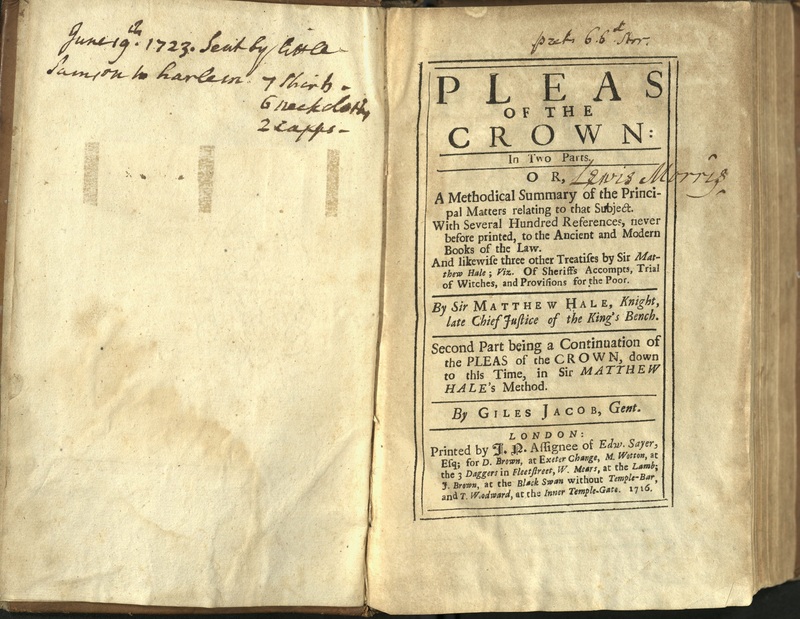Precedents So Scrawl'd and Blurr'd: Readers' Marks in Law Books
Chronicling
A drunken insult. Inside this copy of the Acts of New Jersey are manuscript lists of the members of Assemblies of 1761 and 1768. The more interesting note, however, is scrawled in the bottom left corner. It records the – apparently drunken – outburst directed at Assemblyman William Hancock. In another hand, just below, the insult is recounted as three rhyming lines.
David Wright said
Damn You – Damn W.m Hancock
this 23.d Sept.er – appeared also to be drunk.
I Say Damn you all & More too.
God Spare None of you of you
& the Devill Take the Residue
Currying favor with those in high places. Alberico Gentili, one of the fathers of modern international law, inscribed his landmark treatise on the laws of war to "the illustrious" and "wise judge" Thomas Egerton, who for twenty years as Lord Chancellor was the most powerful official in England under Elizabeth I and James I. Presentation copies such as Gentili's document networks of influence and patronage.
Trophy of a historic battle. In this inscription Justice Joseph Story of the U.S. Supreme Court documents the rescue of his books in one of the U.S. Navy's most famous battles. The Harvard Law Library, inexplicably, sold the set in the late 19th century.
These volumes were ordered by J. Story from Italy. On their passage to the U.S. they were captured by the British Frigate Guerrière & afterwards recaptured in the memorable engagement with the American frigate Constitution commanded by Capt. Hull -- 19 of August 1812. By the politeness of Capt. Hull I received them on his victorious return to the U.S.
A change of heart, a loss of a head. Look quickly and you might miss it, but the single struck-out chapter in the table of contents marks a rather dramatic turn in English history – the loss of Catherine Howard's head. Henry VIII ordered his fifth wife executed for adultery two years prior to the publication of these statutes. In the text that follows, the chapter on Catherine (and any mention of her) is omitted. Instead, directly across from the struck-out line, Henry's new (and final) marriage to Katherine Parr is described.

England and Wales. Henry the Eyght by the grace of God Kyng of Englande Fraunce and Irelande ... beganne this thyrde session of his moste high courte of Parlyament at Westmynster, the. XIIII. day of Januarye, in the fyve and thyrty yere of His Maiesties moste noble and vyctorious reygne. London: Thomas Berthelet, 1544.
Documenting the book trade. Lewis Morris (1671-1746), the first royal governor of New Jersey, often noted the price he paid for his books (for this book 6 shillings, 6 pence, which was about three days' wages for a skilled tradesman in the 1720s), and sometimes also the seller. Today such notes are valuable for the history of the book trade. Morris also recorded a purchase of clothing on the flyleaf. The signature on the title page is of Morris's grandson Lewis Morris (1726-1798), a signer of the Declaration of Independence and a 1746 graduate of Yale College. Their descendants donated the Morris law collection to the Yale Law Library.
Books themselves are durable enough to outlive the generation that produced them, becoming time capsules containing souvenirs of past readings. Second-hand or antiquarian books often come with the names of previous owners written inside. Sometimes they have formal stamps or bookplates declaring the identity of their proprietors, or marginalia showing how they used the book. These traces can open a lane to the land of the dead.
Tom Mole, The Secret Life of Books (2019)






